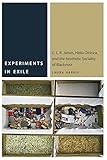Experiments in Exile : C. L. R. James, Hélio Oiticica, and the Aesthetic Sociality of Blackness / Laura Harris.
Material type: TextSeries: CommonalitiesPublisher: New York, NY : Fordham University Press, [2018]Copyright date: ©2018Description: 1 online resource (224 p.)Content type:
TextSeries: CommonalitiesPublisher: New York, NY : Fordham University Press, [2018]Copyright date: ©2018Description: 1 online resource (224 p.)Content type: - 9780823279791
- 9780823279814
- Aesthetics, Black
- Expatriate artists -- United States -- Intellectual life -- 20th century
- Expatriate authors -- United States -- Intellectual life -- 20th century
- LITERARY CRITICISM / Caribbean & Latin American
- Afro-diaspora
- Black radicalism
- Blackness
- C. L. R. James
- Citizenship
- Exile intellectual
- Hélio Oiticica
- Popular culture
- Slum
- Undocumented immigrant
- 818/.5209 23
- online - DeGruyter
- Issued also in print.
| Item type | Current library | Call number | URL | Status | Notes | Barcode | |
|---|---|---|---|---|---|---|---|
 eBook
eBook
|
Biblioteca "Angelicum" Pont. Univ. S.Tommaso d'Aquino Nuvola online | online - DeGruyter (Browse shelf(Opens below)) | Online access | Not for loan (Accesso limitato) | Accesso per gli utenti autorizzati / Access for authorized users | (dgr)9780823279814 |
Frontmatter -- contents -- INTRODUCTION -- 1. WHAT HAPPENED TO THE MOTLEY CREW? -- 2. DIALECTIC OF CONTACT -- 3. UNDOCUMENTS -- ACKNOWLEDGMENTS -- NOTES -- BIBLIOGRAPHY -- Index
restricted access online access with authorization star
http://purl.org/coar/access_right/c_16ec
Comparing the radical aesthetic and social experiments undertaken by two exile intellectuals, Experiments in Exile charts a desire in their work to formulate alternative theories of citizenship, wherein common reception of popular cultural forms is linked to a potentially expanded, non-exclusive polity. By carefully analyzing the materiality of the multiply-lined, multiply voiced writing of the "undocuments" that record these social experiments and relay their prophetic descriptions of and instructions for the new social worlds they wished to forge and inhabit, however, it argues that their projects ultimately challenge rather than seek to rehabilitate normative conceptions of citizens and polities as well as authors and artworks. James and Oiticica's experiments recall the insurgent sociality of "the motley crew" historians Peter Linebaugh and Marcus Rediker describe in The Many-Headed Hydra, their study of the trans-Atlantic, cross-gendered, multi-racial working class of the seventeenth and eighteenth centuries. Reading James's and Oiticica's projects against the grain of Linebaugh and Rediker's inability to find evidence of that sociality's persistence or futurity, it shows how James and Oiticica gravitate toward and seek to relay the ongoing renewal of dissident, dissonant social forms, which are for them always also aesthetic forms, in the barrack-yards of Port-of-Spain and the favelas of Rio de Janeiro, the assembly lines of Detroit and the streets of the New York. The formal openness and performative multiplicity that manifests itself at the place where writing and organizing converge invokes that sociality and provokes its ongoing re-invention. Their writing extends a radical, collective Afro-diasporic intellectuality, an aesthetic sociality of blackness, where blackness is understood not as the eclipse, but the ongoing transformative conservation of the motley crew's multi-raciality. Blackness is further instantiated in the interracial and queer sexual relations, and in a new sexual metaphorics of production and reproduction, whose disruption and reconfiguration of gender structures the collaborations from which James's and Oiticica's undocuments emerge, orienting them towards new forms of social, aesthetic and intellectual life.
Issued also in print.
Mode of access: Internet via World Wide Web.
In English.
Description based on online resource; title from PDF title page (publisher's Web site, viewed 02. Mrz 2022)


